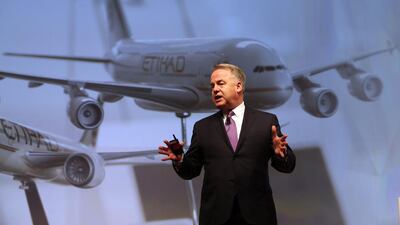Etihad Airways has reached a deal to deepen its relationship with Air France-KLM and separately has agreed to sell its stake in Aer Lingus Group.
Etihad and Air France-KLM will share codes on more flights starting this year, opening more European cities to Etihad’s customers, said James Hogan, Etihad’s chief executive, on Sunday.
He was speaking at the sidelines of the International Air Transport Association’s (Iata) annual meeting. The airlines have yet to finalise the terms of the deal.
Meanwhile, Etihad will sell its 4.99 per cent stake in Aer Lingus, the Irish flag carrier, in a potential takeover attempt by International Airlines Group (IAG), the parent of British Airways.
The moves reflect Etihad's strategy to expand its route map through airline partnerships. With codeshares on French domestic flights imminent, Etihad was also looking to add destinations via codeshares with Philippine Airlines, Garuda Indonesia and Malaysia Airlines, said Mr Hogan.
“We’re keen to maintain a relationship with IAG. Indications are that they are interested in doing so too,” he said.
Kevin Knight, Etihad’s chief strategy and planning officer, said Etihad was hoping to expand its codeshare with Air France-KLM “as broadly as possible”.
Etihad currently lists its flight code on nine Air France cities and 21 KLM destinations.
Mr Hogan said sharing frequent-flyer rewards would be the next step in the airline’s partnership with Air France-KLM. It had not discussed or considered taking an equity stake in the European carrier, although saying this would never happen was “not possible”, said Mr Hogan.
Across the Atlantic, Mr Knight said Etihad did not have plans to introduce new services to the United States within the next 24 months.
The decision to focus on existing US routes contrasts with Emirates and Qatar Airways, which have announced new flights to seven US cities this spring.
The recent expansion of Arabian Gulf carriers’ flights to the US has caused tensions with US airlines to boil.
US airlines said their Arabian Gulf rivals had received more than US$40 billion in subsidies from the UAE and Qatar, which has allowed them to add excess capacity on key routes, drive down ticket prices and grow market share.
The Arabian Gulf airlines have denied the claims.
Etihad said it was required to repay loans, not subsidies, to its sole shareholder, the Abu Dhabi government.
business@thenational.ae
Follow The National's Business section on Twitter

